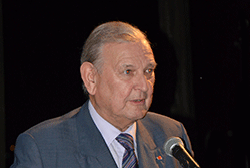Sahel and West Africa Week 2013 › Foreword by the SWAC President De Donnea
Foreword by the SWAC President De Donnea
|
by François-Xavier De Donnea, SWAC President Let me start by thanking the Republic of Côte d’Ivoire for hosting the 2013 edition of the Sahel and West Africa Week. Thank you to the President, His Excellency Alassane Ouattara, his Prime Minister Daniel Kablan Duncan, his Minister of Foreign Affairs Charles Koffi Diby, and his Minister of Agriculture, Mamadou Sangafowa Coulibaly, the latter having accepted to support us day after day in the preparation of this event. I would also like to seize this opportunity to welcome HE Mr Djimé Adoum, the recently appointed Executive Secretary of CILSS. |
 |
| Côte d’Ivoire is a concentrate of West Africa. The country boasts coastline and Sudano-Sahelian areas. It holds the richest ethno-linguistic diversity of the continent. In proportion to its population, it is the second largest country of immigration in the world. It shares with Ghana the world’s greatest cacao-producing plain and with Mali and Burkina Faso, Africa’s most abundant cotton-producing zone. It has access to Mali’s and Burkina Faso’s ports. Côte d’Ivoire has just become a member of CILSS and holds the presidency of ECOWAS. It is in the economic capital of this regional melting pot that the Club’s 2013 annual meetings are held over five days, bringing together Ministers and farmers’ associations, livestock farmers, high representatives of regional organisations and co-operation agencies, researchers and local elected representatives, entrepreneurs and NGOs. The stakes are numerous. The Global Alliance for Resilience Initiative (AGIR) is in the starting blocks for a new phase of country-level activities. The presence of several Ministers at the Senior Experts’ Group Meeting on 27 November shows the stakeholders’ commitment to concrete action, the road to which has been meticulously paved. I do not for one instant doubt that the technical and financial partners will accompany this process as they have so committed to doing. The SWAC Forum will focus on the future of the Saharo-Sahelian zones, object of serious concerns. We are relieved that the international community is mobilising around this formidable issue. This includes the recent approval of the United Nations Integrated Strategy for the Sahel and the EU’s commitment through its Strategy for Development and Security in the Sahel; strong initiatives undertaken by the World Bank and the African Development Bank; and the flagging of the Sahel as a priority in a number of bilateral programmes. This remarkable mobilisation supports the programmes and strategies of the concerned countries as well as of their regional organisations – ECOWAS, UEMOA and CILSS. The latter is particularly important as we are faced with a truly regional challenge. But how to tackle this regional problem on a regional scale? How to simultaneously affect development and security -indeed, how to secure development- ? How to promote dialogue with North Africa? The Forum will foment discussion around these political questions. The announced participation of several Ministers of Foreign Affairs bears witness to the strategic importance of the debate. In addition to the traditional meetings of the Food Crisis Prevention Network (RPCA) and the Club’s Strategy and Policy Group (SGP), the UEMOA Commission will present its Regional Fund for Agricultural Development at a side event. Finally, beyond our official programme, we will all have the opportunity to engage in discussions and meetings with colleagues, taking advantage of this coming together of Sahel and West Africa family. After all, that too is one of the vocations of our Week. I wish all of you a studious and pleasant stay in Abidjan. |
Related Documents

